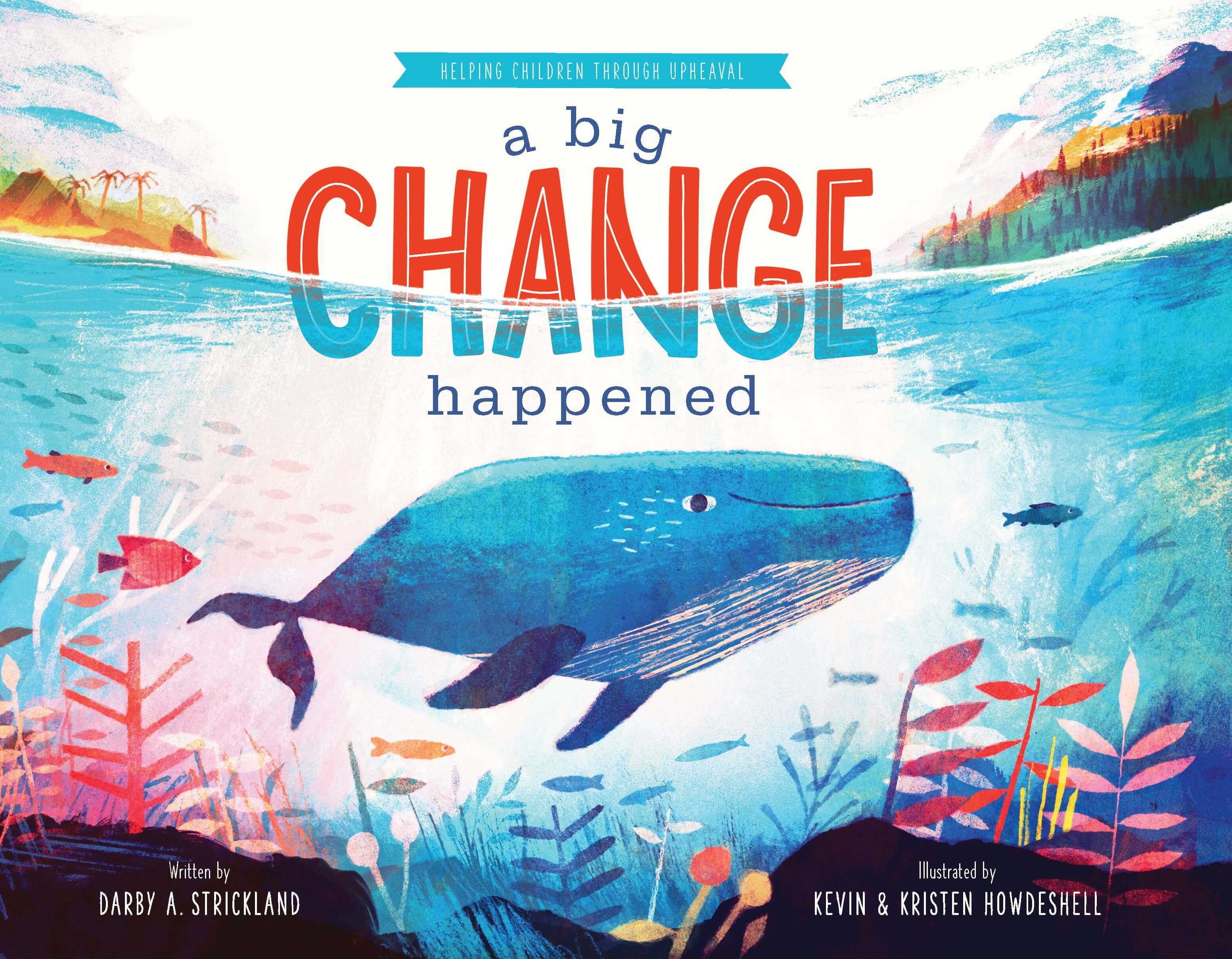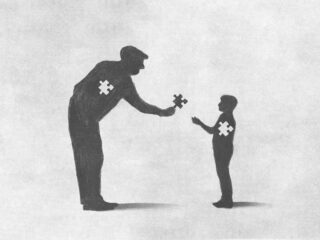Change affects every family. Some changes are exciting, such as moving into a new home or welcoming a new baby. Some changes are painful, such as divorce, illness, or the loss of a relationship. Even joyful changes can be disorienting, while painful ones can feel devastating. For children, the uncertainty that comes with any change can be overwhelming.
Kids thrive on predictability. They feel safe when their surroundings are familiar and secure. When life changes unexpectedly, they may lack the words or perspective to comprehend what is happening. Their behavior might change. They might ask the same questions multiple times, act out, or become unusually withdrawn. Beneath those behaviors often lies a single, significant question: “Will I be okay?”
Psalm 46 provides insight into understanding our children’s emotions, helping us to be present for them and guiding them to recognize the unchanging nature of God amidst their fears.
When experiencing a big change, children need more than just reassurance; they need clarity about what to expect and who they can rely on. Psalm 46 provides a clear vision of God’s nearness, along with a reassuring reminder that he is strong, present, and faithful, regardless of the changes happening in the world around us.
Psalm 46 begins with a bold and comforting truth:
“God is our refuge and strength,
a very present help in trouble.
Therefore we will not fear
though the earth gives way . . . ”Psalm 46:1–2
What a vivid picture the psalm paints: the earth gives way, mountains crumble, the seas roar and foam. It’s the language of life unraveling. While it may sound extreme to us, it provides clear insight into how children experiences change. Familiar and predictable things serve as their anchors. When these anchors shift—whether due to a move, a change in school, or a divorce—it can feel as though their entire world is being pulled out from under them. What seems manageable to us as adults can feel chaotic to a child. The ground is trembling. The waves are crashing. Change evokes deep fears about the uncertainties that lie ahead.
Psalm 46 does not dismiss fear; instead, it acknowledges it and counters it with a greater truth: God is our refuge. He is approachable. He is “a very present help in trouble.” Right now, in this very moment, God is close, powerful, and ready to help.
This is what our children need to see. We can’t protect them from all pain or control the unpredictability of change. We can support them through this journey by reminding them that even when life changes, God remains the same. He is our refuge.
Listening to Your Child’s Uncertainty.
When your child is having difficulty adjusting to change, help them to identify what feels scary or sad. Take the time to acknowledge their fears. Encourage them to discuss them. As your child goes through changes, you can expect to hear the same questions repeatedly: “Where will I sleep?” “Will I still see my friends?” “What if I don’t like my new school?”
These questions are often more about emotional security than information. They are asking, “Can I trust you? Am I going to be, okay?” Instead of dismissing them, embrace each one as an opportunity to provide calm reassurance and gently repeat the truth: God is with us. You are not alone in this.
Also, you can help them discover where God meets them (and you) in the middle of the changes. You could say:
- “God knows what we are feeling and promises to help us.”
- “Even when everything changes, God stays the same.”
- “He is strong enough to carry what we’re uncertain or afraid of.”
These aren’t mere comforting phrases—they’re spiritual truths that take root through repetition and as you live them out together. As your children see you turning to God in times of uncertainty, they’ll learn to do the same.
Teaching Children to Find Shelter in God
Over time, children need more than just answers—they need a sense of security. A picture of where they can go when they feel overwhelmed. That’s why the imagery of refuge is both comforting and tangible, providing a clear sense of the security their hearts long for.
Refuge is a vivid and accessible image for children. You might picture it with them: a sturdy fort in a storm, a warm blanket on a chilly night, a parent’s embrace when the world feels overwhelming. These images help children grasp what it means to run to God, our fortress, when they’re afraid.
I remember a car ride I had with my daughter just before her first day at a new dance studio. She gazed out the window, nervously fidgeting with her bag, before finally saying, “What if no one talks to me?” I could hear the fear under her question. I reminded her, “Remember how God is your fortress? You can talk to him when you feel nervous. You can even whisper a prayer before you walk in.”
That night after class, she climbed into the car and said, “I prayed right before I opened the door. I still felt scared, but it helped. And someone smiled at me.” She found refuge, not in her courage or the outcome of the moment, but in the nearness of God who goes with her. Sometimes, what our children need most is a gentle reminder that they are not alone facing the unknown—that the God who is our refuge walks alongside them.
Helping Children Settle When Life Feels Unsettled
Psalm 46 doesn’t just name the chaos—it offers us a place of refuge within it:
“Be still, and know that I am God.”
Psalm 46:10
This is not a call to silence; it’s a call to surrender. We must remember that there is one who reigns above all turmoil. For a child experiencing change, feeling secure can often seem unattainable. Their world has been disrupted, and what was once familiar is now unknown. They lack the life experience to understand what to expect. Their little hearts are asking questions like, “What if everything is different? Who is going to help me? “What if I don’t like it?”
God has put you in their life to help them find answers to their questions—not with perfect solutions, but with a steady presence and the hope of the gospel. You help your child “be still” not by fixing the chaos, but by guiding them to the God who never changes. It could mean kneeling beside their bed to whisper a prayer when they feel scared. It could be as simple as singing a hymn together in the car or reminding them, “God is with you right now, even in this hard thing.”. These aren’t just comforting habits; they’re invitations to see God as their helper. You are guiding your child to remember who God is—the one who is strong, near, and unshakably good.
When your child is struggling, you might feel the urge to be their haven by resolving all their problems and shielding them from experiencing any pain. But Psalm 46 offers freedom: You are not their refuge. God is.
That doesn’t make your presence less important, it makes it more meaningful. You are God’s chosen comforter for your child, but you’re not expected to carry what only God can. Parenting through change isn’t about being superhuman—it’s about being dependent.
Seeing Your Own Need
Change is hard on parents, too. We also must learn to depend on the Lord in seasons of upheaval. Just like we’re helping our children cultivate stillness, we’re learning to do the same. And it doesn’t come easily.
Our children are always watching. They notice how we respond when things fall apart. When life shifts in ways we didn’t choose or plan, we have an opportunity to show them what it looks like to turn to God.
We shouldn’t conceal our struggles or feign strength. It’s perfectly acceptable to say, “This is hard for me too.”. But when they see us pause to pray or cling to a promise in Scripture, we’re showing them something more potent than any explanation—we’re showing them where peace comes from. You don’t need to have it all together. You need to keep pointing your own heart to the refuge God offers. That quiet dependence, however messy or tearful, it looks, is what your children will remember. As you find rest in his presence, you permit them to do the same. And in the middle of change, they begin to see that they are not alone.
The strength God gives isn’t about energy or optimism—it’s about presence, trust, and staying close to him. So be present. Be gentle. Be honest. Most importantly, keep pointing your child to the refuge that will never fail.
While you may not always succeed, your silent reliance on the Lord conveys a powerful message. By demonstrating how to trust God in times of uncertainty, you teach your child something far more enduring than mere control or certainty. By placing your trust in God during uncertain times, you impart to your child the invaluable lessons of faith and reliance. They discover where to turn when life becomes challenging and whom to trust when faced with the unfamiliar.
In the end, your faithfulness in the small moments becomes a testimony of God’s faithfulness to them. You’re not just guiding them through this change; you’re giving them a picture of our God who is strong enough to carry them through the challenges ahead. And you’re showing them the goodness of Jesus, who walks beside them, speaks peace to their storms, and never stops helping his people.
What Change Feels
Like to a Child
- Disorientation – “Why is everything different?”
- Fear of abandonment – “Will you still be here?”
- Loss of control – “No one asked me if this could happen.”
- Grief for the familiar – “I miss how things used to be.”
- Unspoken guilt or blame – “Did I do something wrong?”
- Overwhelmed with choices or unknowns – “What if I don’t like my new school?”
- A craving for reassurance – “Will I be okay?”
Children don’t always express their emotions in words. Watch for changes in sleep, behavior, or clinginess. These signs are often how their hearts are trying to speak.
A Big Change Happened
Wallace Whale loves his home in the warm blue sea near the green island where he and Mama sing, eat, sleep, and play. But one day, Mama tells him about a big change—they’re leaving for a long journey North! Wallace is worried and has so many questions: What will the North be like? Will he be okay? As they swim into the unknown, Mama gently reminds Wallace: Wherever you go, whatever you do, God’s love follows you.







